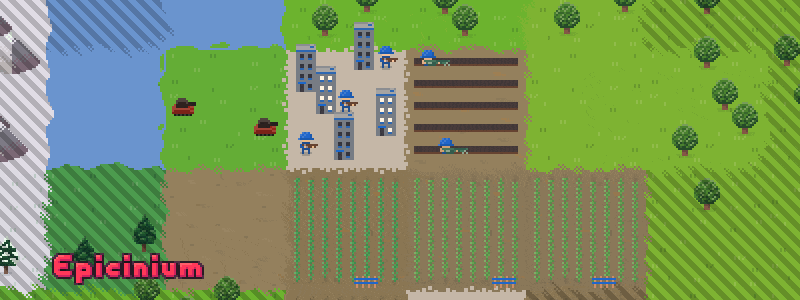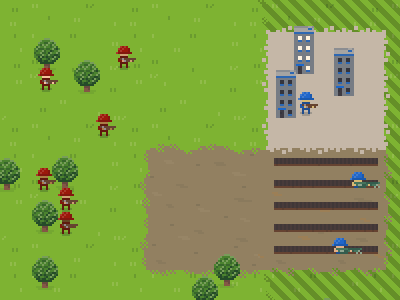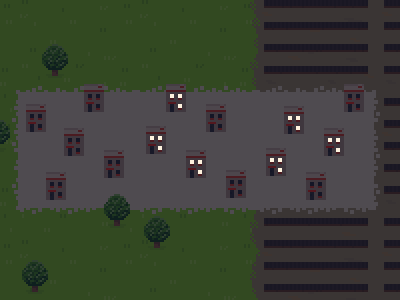Epicinium - environmental turn-based strategy
Hi all! I've been developing this game together with my friend SLiV for the last months. I'm excited to share occasional updates and insight into the development process with you. Epicinium is currently in open beta; download links can be found on our project page.
The game currently features online multiplayer 1v1 and 3- or 4-player free-for-all games, as well as AI opponents and an in-game tutorial. We're actively developing this game, so we try to put out a new version every week or so. Every Saturday we hold an online playtest session starting at 20:00 GMT, which you are of course very welcome to join. We also livestream this event on SLiV's Twitch channel.
We've been somewhat overwhelmed by the response since making our itch.io project page and posting a release announcement: already more than 300 downloads and several players per day joining the server and trying out the tutorial. Sharing our project with the itch.io community has done more for us than months of bugging friends and family to please go play it. We're very encouraged by the response, thank you so much! :-)

Introduction video
For an idea of what a game of Epicinium looks like, watch the introduction video where SLiV commentates a match of himself taking on the HungryHippo AI:
Development
SLiV and I started development on Epicinium last May. After studying at the University of Amsterdam and working as software developers for a while, we found we both aspired to be full-time video game developers, wanting to combine the logical challenges of coding with our creative impulses. We had several ideas for games, but had to abandon some of them because they proved too ambitious for us at the time (but I'd love to return to them in the future!).
Eventually, we settled on our current idea: a multiplayer turn-based strategy game, inspired by Advance Wars, but with a twist: the war between players impacts the environment. As a consequence, players have to strike a balance between maximum firepower and not destroying the world we live in. After all, is it worth winning a war when you end up conquering nothing but dirt and ash? This inspired our working title, Aftermath.
We built the game in C++ on top of SDL. After working on the engine, game logic and combat system for a few months, SLiV made the initial sprites and I the initial netcode so we had a playable prototype. We held a few alpha playtests with a bunch of friends in the same room, which proved to be very fun (though bug-ridden). In November, we decided to rent a server and start an open beta. This is a multiplayer game after all!
Since then, our development has focused on making the game more accessible, understandable and attractive. Recent additions are an in-game tutorial, gameplay sound, a simplified weather system, 3- and 4-player maps, and loads of bugfixes and balance improvements. At the moment we are working on:
- Increasing our exposure and playerbase.
- Resolving a persistent networking issue where TCP connections are occasionally half-dropped without apparent reason.
- An HD version of the planet logo.
- Finding inspiration for the title screen music.
- A dynamic gameplay music system that reacts to what's happening on-screen.

Interesting points
Some points that I think are unique about Epicinium or interesting to fellow developers:
- Built by two people in C++ on top of SDL with our own custom game engine.
- Developed in Linux, compiled for Linux, Windows and Mac OS X.
- A simultaneous turn system, where players issue their orders at the same time in the Planning phase, and then watch them play out in the Action phase.
- Combat system in which the units don't have "hit points" in the traditional sense. Instead, a unit consists of figures which each take a certain amount of hits to kill, without memory. This way, a player can see a unit's health and strength at a glance by counting its figures. See the wiki for an in-depth explanation.
- The game logic is separated from the visualization. The server communicates with the client via a JSON API, only sending the information the client should have access to. No fog of war cheating here!
- It is easy to do a quick simulation of a game because of the board game-like logic. Simulating multiple complete games per second is very interesting for developing AI opponents, for example using neural networks.
- Inspired by old 8-bit games, the visuals use indexed sprites, where the color palette is sent to the GPU separately. This way, we can transition smoothly between colors by simply updating the palette. We use this during the day/night, snow and window light transitions, for instance (not properly captured by gifs).

We will regularly post updates here. We're curious what you think! Comments and feedback are very welcome and we will happily answer your questions and go into detail.
Links
Facebook: https://www.facebook.com/EpiciniumStrategy
Twitter: https://twitter.com/EpiciniumGame
Mailing list: http://groups.google.com/group/epicinium (stay informed about the latest Epicinium events and updates)
GitHub: https://github.com/SLiV9/epicinium (binaries, release notes, documentation and game rules wiki)
Discord: http://discord.gg/XktTKrH (find opponents and have a chat with the developers)
Twitch: https://www.twitch.tv/sliv9 (SLiV streams the weekly playtests and occasionally development; watch past streams)
Epicinium (Beta)
Turn-based strategy game where your impact on the environment matters
| Status | Released |
| Authors | A Bunch of Hacks, SLiV |
| Genre | Strategy |
| Tags | 2D, Destruction, environment, GitHub, Multiplayer, Pixel Art, Retro, Turn-based, Turn-based Strategy, War |
| Languages | English |
More posts
- Kickstarter dev match on Friday - more modes & strategiesNov 22, 2018
- Epicinium, on Kickstarter now: live Q&A tonight - unique environmental mechanicsNov 12, 2018
- Epicinium now live on Kickstarter!Nov 02, 2018
- Epicinium, environmental strategy game, is coming to KickstarterOct 19, 2018
- From Open Beta to Closed Beta + v0.29.0 releasedSep 21, 2018
- Version 0.28.2: Discord integration and UI improvementsSep 01, 2018
- New challenge in v0.27.0: Everything Is FreeAug 07, 2018
- Challenges arrive in v0.25.0Jul 07, 2018
- Balance changes in version 0.24.0Jun 01, 2018
- Beta 0.23.0: new Militia unit and other gameplay changesMay 26, 2018

Leave a comment
Log in with itch.io to leave a comment.